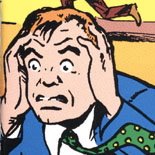I hate the concept of the gene for mutant powers, or "X-gene", in X-Men comics. It's stupid and it leads to bad stories and muddled meanings, but I specifically hate it for four reasons. The first is scientific, the second semantic, and both are pretty petty and pedantic, but they tie into the third, substantive reason, so I'll try to get through them quickly to get to the fourth.
1. The Mutant Gene Doesn't Act Like a Gene.
A gene is a specific sequence of DNA that codes for a particular physical characteristic. A particular gene might determine whether your eyes are blue or black, but that same gene in another person won't give him stronger back muscles. Even taken to the exaggerated superhero level, the same gene can't give one guy the ability to fire lasers out his eyes and another guy fully functional wings!*
2. An X-Gene Means "Mutants" Aren't Mutants.
A mutation is a change in a gene, a mutant is a changed gene or organism arising from that changed gene. The key here is change. A mutated gene is one you did NOT get from your parents, that you have and your siblings don't. If the "mutant" gene is shared among individuals, if it is inherited, then it is, by definition, no longer a mutant, and a person who exhibits traits associated with that gene is not a mutant either.
But both of those complaints are really nerdy. After all, when you're dealing with pulp science fiction, you have to put up with some bad science and mangled language as plot devices. But the reason the "mutant" gene bothers much more than does its DC equivalent the "meta-gene" is because it's a plot device that hurts the plot it's try to support:
3. The Mutant Gene Undermines the Metaphorical Power of X-Men.
At its core, X-Men is about individuals, shunned and rejected by society at large, alienated from everyone, who come together to form a new family of choice in order to survive, thrive and relate back to the larger world. Now, whether that's an allegory for racial politics, homosexuality, or teenage rebellion in general, who better to play the role of the outcast than a LITERAL mutant, someone who, on a genetic level, is cut off from his own family? And that the X-Men don't share DNA in common, that they are connected by their otherness from everyone in the world, including each other, makes their new family bond all the more meaningful, a celebration of our shared humanity over our superficial differences.
If Marvel "mutants" are not literal mutants, however, if they inherited their power from some rare recessive gene, then they would still have a family connection. Maybe not their parents, but an aunt or distant cousin should be a "mutant" too. If there is a mutant gene, then it doesn't make sense for it NOT to run in families. And if their "mutant" gene connects them to their family rather than dividing from their family, then the power of the metaphor is severely weakened.**
And if "mutants" share a specific gene, then it seriously weakens the idea of the X-Men as a family of choice. "Mutants" are a lot closer to being a new species, united by their shared genetic identity, rather than simply humans who have happened to have the odd quirk in their genetic structure. You lose the sense of people defying their genes to find each other, and gain an unheroic doom of a group giving into it's collective genetic destiny.
And then there's the fact that:
4. The Mutant Gene is Completely Unnecessary to Explain the X-Men.
Mutation is REAL thing. Mutants happen all the time and in fact you almost certainly have a few mutant genes in you. But only a very small percentage of mutations have any noticeable effect on the body at all, and 99% of those that do cause cancer or are pre-natally fatal.
BUT... in the Marvel Universe, things that would cause cancer or instant death in our world, like MASSIVE DOSES OF RADIATION, instead grant superpowers. So superpowered mutants would be the natural byproduct of such a world. So instead of having a "mutant gene" which 1. doesn't make scientific sense, 2. is a contradiction in terms, and 3. undermines the story you are trying to tell, you could just leave it at "They're mutants," AND BE DONE WITH IT!
*And don't give me Byrne's "they all DO have the same power, to 'warp reality,' they just warp it differently," because that still doesn't answer WHY one warps reality by controlling the weather and the other warps reality by being really fat. *
**The worst was a line in X-Men 2, where Pyro tells Iceman's mother that the X-gene is carried by the father, not the mother. The only way that can happen is if the X-gene is on the Y chromosome. This is doubly stupid, because a) it means only people with Y chromosomes could have mutant powers, and Rogue is sitting right there! And b) the Y chromosome cannot carry a gene without expressing it, so Iceman's father and brother should be "mutants" too, and they aren't.**



